Croatian Parliament Wraps Up First Session, Adjourns Until Early September
ZAGREB, July 31, 2020 - After appointing about 20 of its committees and delegations, the new Croatian Parliament concluded its first session on Friday and adjourned until early September.
The second, extraordinary session has been scheduled for 2 September.
"I wish you all the best and see you soon," Parliament Speaker Gordan Jandrokovic told lawmakers.
The Croatian parliament regularly sits between 15 January and 15 July and between 15 September and 15 December. Any sittings outside these dates are referred to as extraordinary.
Croatia Confirms 67 New Coronavirus Cases, One Death in Last 24 Hours
ZAGREB, July 31, 2020 - A total of 67 new coronavirus cases and one death have been reported in Croatia in the last 24 hours.
"In the last 24 hours, 67 new cases of infection with SARS-CoV-2 have been recorded, bringing the total number of active cases to 727," the national coronavirus crisis response team said on Friday.
Among them, 125 infected people are receiving hospital treatment and six of them are on ventilators.
One person has died in the last 24 hours, bringing the death toll to 145.
Since February 25, when the first case was registered in Croatia, 5,139 people have been diagnosed with the novel coronavirus, 4,267 have recovered, and 2,746 are currently in self-isolation.
To date, 118,955 have been tested, including 1,750 in the last 24 hours.
Croatian Parliament Adopts Reports on EU Presidency and Emergency Summit
ZAGREB, July 31, 2020 - The Croatian parliament on Friday adopted the report on the activities and results of the Croatian presidency of the Council of the European Union and the prime minister's report on the July 17-21 emergency EU summit.
Both reports were backed by the ruling majority parties, which command 76 seats in the 151-member legislature.
Presenting the report on the EU summit, Prime Minister Andrej Plenkovic highlighted the fact that Croatia had won a considerable package of financial aid both under the Multiannual Financial Framework and under the new economic recovery instrument called Next Generation EU, adding that this would have "far-reaching consequences for our economic development, social cohesion as well as for the progress of Croatia and the European Union."
"We are talking about €1.824 trillion, of which Croatia will have access to over €22 billion, or HRK 165 billion, over the next four and seven years respectively," Plenkovic said, noting that this was double the amount made available to Croatia in the 2014-2020 period.
Plenkovic said that this was one of the largest amounts per capita "which will ensure that for each euro invested we get more than 4.5 euros from the EU budget."
Presenting the report on the Croatian presidency of the Council of the EU in the first half of the year, Foreign and European Affairs Minister Gordan Grlic Radman said that this was the crown of Croatia's European journey and a historic moment.
The first Croatian presidency took place at a time of two unpredictable crises - migrant pressure and the COVID-19 pandemic in which "Croatia has successfully adapted," the minister said.
He also mentioned a strong earthquake that struck Zagreb on March 22. "It was the first time that the capital of a presiding country had been hit by an earthquake," Grlic Radman noted.
PICTURES: Converted Island Monastery LOPUD-1483 Near Dubrovnik Offers Stunning Luxury
July 31, 2020 - PICTURES: Converted island monastery LOPUD-1483 near Dubrovnik offers incredible luxury
Set inside a former 15th-century monastery, LOPUD-1483 is one of the newest luxury dwellings south Dalmatia has to offer. Located on a car-free island, just seven miles off the coast of Dubrovnik, the stunning property has already caught the eye of the international press.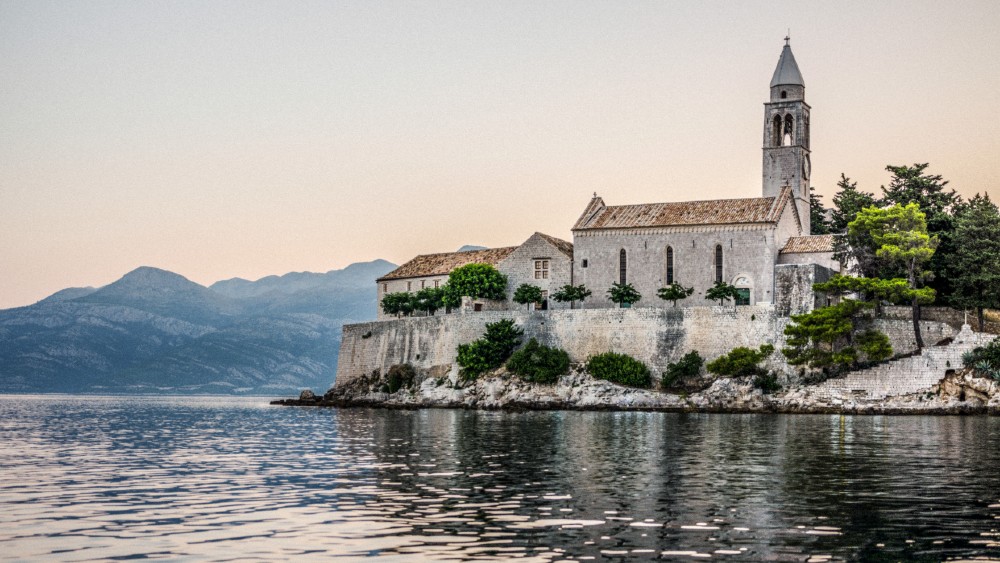
© LOPUD-1483 lies inside a former island monastery and walled fortress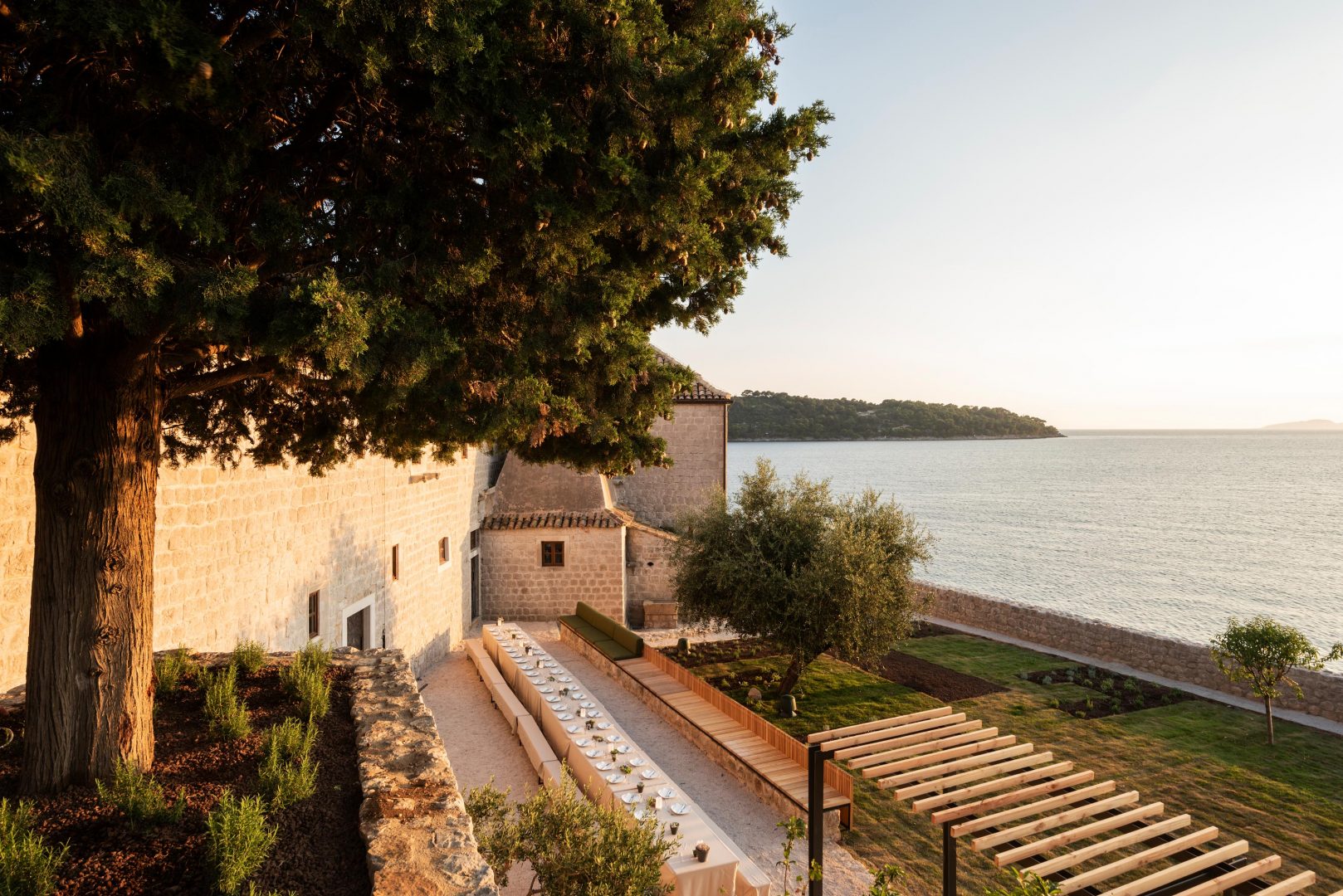 Sunset from the terrace
Sunset from the terrace
Available as an exclusive buy-out for groups during peak season (its five suites are available individually later in the year), LOPUD-1483 also features a slightly younger walled fortress which lies adjacent, surrounding manicured gardens and an unobstructed view of the sea, lying just a few metres away.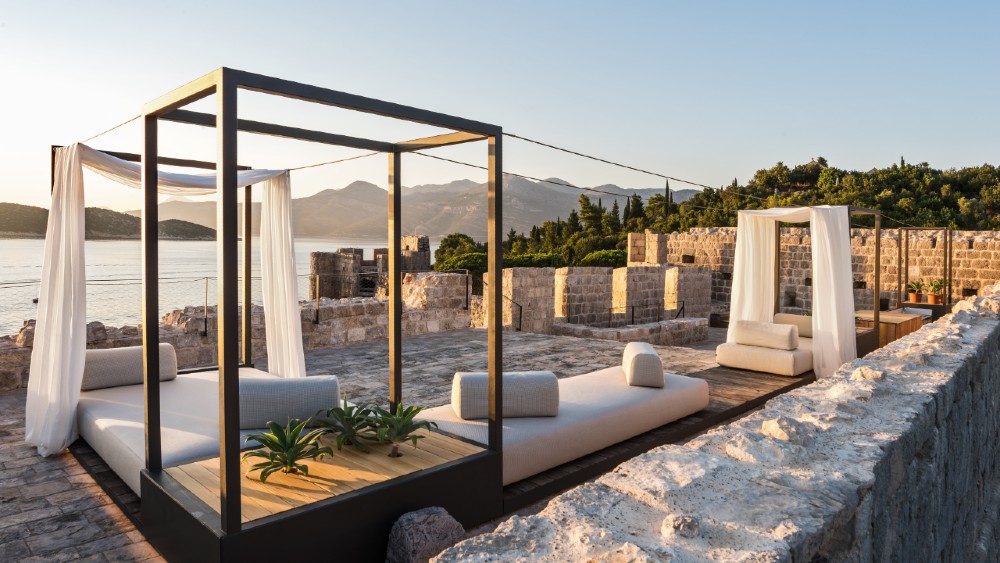
Head to the rooftop for relaxation or yoga sessions
It is aimed towards family or other groups who can rent together, such as those organising yoga retreats, small business conferences, weddings and birthday parties The property balances its historic architecture with contemporary interior design and all the fixtures and fittings you'd expect fro a luxury resort.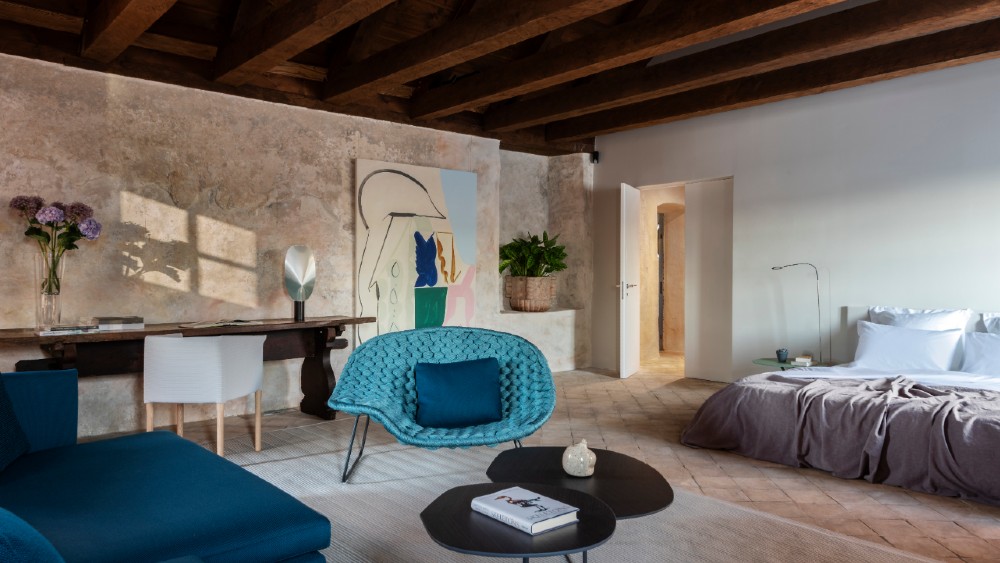
The property balances its historic architecture with contemporary interior design and all the fixtures and fittings you'd expect 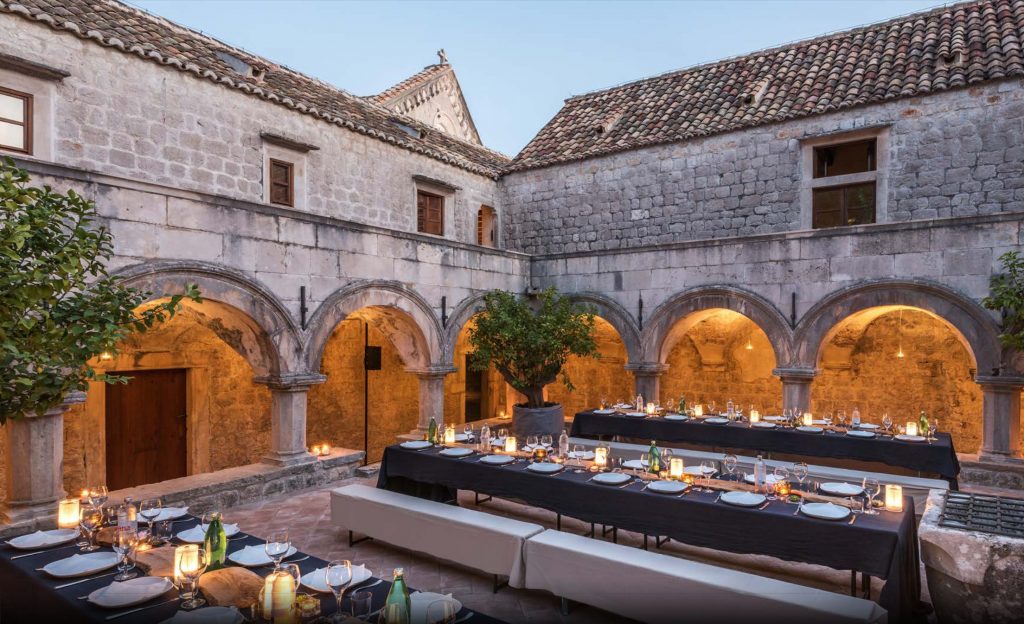
The courtyard dining area is perfect for weddings or functions
LOPUD-1483 also holds ample space to display art and this year has a season-long exhibition from a private collection belonging to the Thyssen-Bornemsza family. The resort has the option of private chefs and a complimentary boat service between the island and Dubrovnik for longer-staying guests.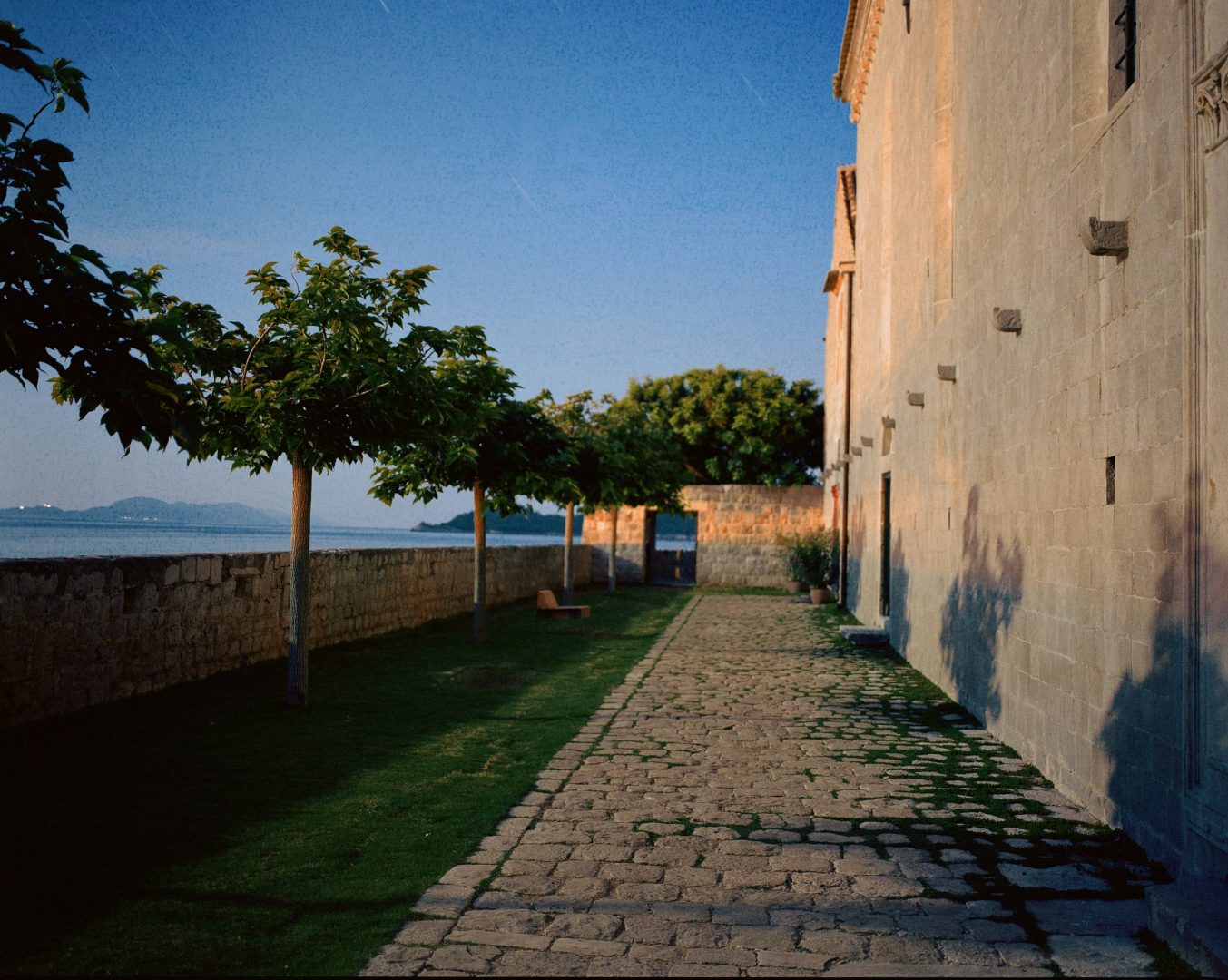
Walls of the historic property are just yards fro the sea
Rates start at €1,400 per night, including breakfast, with a minimum three-night stay. Buy-outs start at €10,000 per night.
All photos © LOPUD-1483
Croatia Osiguranje Insurer with HRK 204 m Profit in H1
ZAGREB, July 31, 2020 - The Croatia Osiguranje insurance company posted a consolidated net profit of HRK 204 million in the first half of 2020, which was 1.8% down compared to the corresponding period in 2019, the insurer reported on Friday.
The H1 2020 total premium written in the group was HRK 1.87 billion, down by 5.8% on the year.
The share of non-life insurance is 1.59 billion, rising by 0.5%, whereas premium on life insurance dropped by 30.8% to HRK 276 million.
The insurer's total assets rose by 4.6% since the end of 2019 to HRK 13.4 billion on 30 June 2020.
(€1 = HRK 7.5)
Beljak Reelected HSS Leader
ZAGREB, July 31, 2020 - Croatian Peasant Party (HSS) leader Kreso Beljak was reelected president of this parliamentary party during Thursday's intra-party election convention.
Out of the 965 delegates who were eligible to vote in the election, 610 took part, and of the 508 voted for Beljak, while his rival, Zeljko Lenart, who is the HSS secretary-general, won 101 votes. One ballot was invalid.
Beljak and Lenart are the only two HSS parliamentary deputies in the new, 10th national legislature.
Upon the declaration of the results on Thursday evening, Beljak said that he was aware that the HSS had scored poor results in the 5 July parliamentary elections, and admitted that it was partly his fault.
"I will do my best to make sure that mistakes from the past will not be repeated."
He also promised the improvement of his public discourse and the defusion of tensions within the party.
As for those party members who contested the legality of the election convention, Beljak said that anybody who had doubts about the regularity can report that to competent bodies.
This is their right, however, it is sad that they express those doubts in statements to media. There has been enough quarreling in the HSS, he said and added that the HSS should adhere to its slogan "Faith in God and Peasant Unity".
HEP to Construct More Solar Power Plants in Croatia Throughout 2020
As Poslovni Dnevnik/PD VL native tim writes on the 31st of July, 2020, by building such power plants, HEP can ensure that in sunny areas, the energy drawn from them can supply a large number of consumers. This is especially important, for example, on Croatia's many islands, where solar power plants can become an extremely important factor.
Given that they are efficient and don't have harmful products in the production of electricity, they have an important position in the European Green Plan, which primarily implies a significant reduction in harmful amounts of CO2 in the atmosphere.
The goal of the Green Plan adopted by the European Commission is to make Europe the first climate-neutral continent by 2050. This poses great challenges, but also opportunities for all member states of the European Union.
Exactly how is Croatia currently positioned in all of this?
Croatia is in sixth place, ie at the very top of the list of EU countries, according to the share of renewable energy sources in gross final energy consumption. According to Eurostat's data, for 2018, the share of RES in total gross electricity consumption in Croatia was 48 percent. In order for Croatia to meet its goal set in the Energy Development Strategy until 2030, with a view to 2050, it is necessary to build more than 1000 MW of solar power plants in the next ten years.
HEP plans to increase production from renewable energy sources by 50 percent by 2030. This goal is planned to be achieved by revitalisation, ie increasing the power and production of existing hydropower plants, the construction of new hydropower plants and significant investments in wind farms, solar power plants and other renewable sources. HEP has its Kaštelir solar power plant in operation in Istria, and this year alone, seven more will be built, and in cooperation with cities and municipalities, there will be as many as eleven new solar power plants across Croatia.
The solar power plant on the island of Vis, with a connection power of 3.5 MW, located on the Griževa glavica hill just southwest of the town of Vis, is already in trial operation. The expected annual production is about 5 million kWh of electricity, which can meet the needs of about 1,600 households. Thanks to the construction of this facility, the island of Vis received its own source of renewable energy and greater security of its own electricity supply. HEP is implementing this project in cooperation with the well known Croatian company, Končar, whose products are installed in the power plant. The value of the investment stands at 31.3 million. kuna In the next phase, a 1MW battery tank with a capacity of 1.44 MWh will be installed next to the power plant, which will be used to provide electricity balancing services and to preserve the stability of the network on the island.
In the area of the municipality of Žminj in Istria, the Marići plant, worth 9 million kuna, is about to be put into operation. It will produce about 1.2 million kWh of electricity annually, and should be commissioned during August this year.
The Kaštelir 2 solar power plant is being built at the Sabadin location in the area of the Kaštelir-Labinci municipality in Istria, and will produce 2.9 million kWh. The value of the investment is 15 million kuna. The project represents an extension of the existing SE Kaštelir, which has been in operation since back in December 2018 and in 2019, it produced 1.5 million kWh.
The Vrlika Jug solar power plant, worth 11 million kuna, represents the realisation of the first phase of the planned construction in the southern part of the Kosora Work Zone, in the area of the town of Vrlika. The connected power of the power plant will be 2.1 MW, and the expected annual production will be around 2.9 million kWh. It should start operating by the end of 2020.
The Obrovac solar power plant, worth 42.6 million kuna, is being built on the site of a former alumina factory. The expected annual electricity production of about 8.9 million kWh will be able to meet the needs of 2,800 households.
In the second half of 2020, the Stankovci solar power plant will be built. The expected annual production of 4.6 million kWh of electricity will be enough to supply 1,500 households. The value of the investment is 26.3 million kuna.
At the end of June, works were opened on the construction of the largest solar power plant in Croatia, on the island of Cres. The Cres solar power plant will contribute to strengthening the security of electricity supply and increasing the degree of energy self-sufficiency of the islands of Cres and Lošinj, especially in periods of increased consumption during the tourist seasons. The SE Cres project, worth 41 million kuna, was developed by Primorje-Gorski Kotar County until the location permit was obtained, when the project was taken over by HEP, which entrusted the construction to a consortium of PVI Solar, PVI GmbH, Intecco and Deling.
The 6.5 MW power plant will produce about 8.5 million kWh of electricity per year, which corresponds to the consumption of about 2,500 households. It covers an area of 17 hectares and is divided into 13 segments of individual power with a total of 20,330 solar panels that will be placed so as to allow for the unimpeded passage of small animals inside the solar power plant fence, as well as grazing sheep within the fenced area. Production will begin by the end of this year.
HEP cooperated with Croatian production forces on the construction of all of these power plants, and all the installed panels were from the successful Varaždin-based company Solvis.
HEP is considering the construction of two more solar power plants on the island of Cres, SE Cres 2 of 4.14 MW and SE Ustrine near Osor, with a capacity of 9.99 MW, which it is developing on the basis of a cooperation agreement with Primorje-Gorski Kotar County and Mali Lošinj.
As part of the EU INSULAE programme, HEP plans to build a 1 MW solar power plant with a battery tank on the island of Unije. This project is being developed in partnership with the Kvarner Energy Development Agency.
By 2023, HEP will invest 750 million kuna in solar power plants
Such projects are a great opportunity for all Croatian cities and municipalities, and on July the 2nd, 2020, HEP published a Public Invitation to all interested partners to express their interest in the development and sale of renewable energy projects in the Republic of Croatia, which will remain open until December the 31st, 2020. The call was sent to local self-government units for the joint preparation of development documentation for solar power plant projects, as well as legal and natural persons with slightly different criteria.
HEP decided to announce a new public call based on good experience in the response to their previous call from back in 2019. Based on the analysis of received expressions of interest and communication with local governments as potential partners, from September 2019 to April 2020, HEP signed agreements with 11 municipalities and cities on the development of solar power plant projects, with a total capacity of 120 MW.
HEP will invest 750 million kuna in the cycle of construction of solar power plants in Croatia during the period from 2019 to 2023 alone. These and other newly built HEP power plants will help meet Croatia's obligations in implementing the European Union's ambitious energy and climate goals, which were recently given their framework in the form of the European Green Plan.
For more, follow our business section.
Flights to Croatia: Croatia Airlines Announces August Flight Schedule
July 31, 2020 - The latest news from around Croatia’s airports for flights to Croatia with updates from Zagreb, Split, Dubrovnik, Zadar, Pula, Osijek, and Rijeka.
Croatian Aviation reports that Croatia Airlines has announced its flight schedule for August. The Croatian airline will thus operate to all airports in Croatia, with as many as 37 domestic and international routes from Zagreb, Osijek, Pula, Rijeka, Zadar, Split, Brac and Dubrovnik. Here is a look at the schedule on all lines for August.
Lines from Osijek
Osijek - Dubrovnik continues to operate once a week in August, every Thursday, on a DashQ400 aircraft with a capacity of 76 seats,
Osijek - Split continues to operate once a week in August, every Friday, on a DashQ400 aircraft with a capacity of 76 seats.
Lines from Zadar
Zadar - Zagreb line will operate once a day on Tuesdays, Wednesdays, Thursdays and Fridays from August 3, while two flights a day have been announced on Sundays. From August 10, flights are announced once a day every day of the week, but on Thursdays, Fridays, and Sundays, there will be two daily flights on the DashQ400 aircraft with a capacity of 76 seats.
Lines from Pula
Pula - Zagreb from August 3 will operate once a day on Tuesdays, Wednesdays, Thursdays and Fridays, while on Sundays, two flights a day are announced. From August 10, flights are announced once a day every day of the week, but on Thursdays, Fridays, and Sundays, there will be two daily flights on the DashQ400 aircraft with a capacity of 76 seats.
Lines from Rijeka
Rijeka - Munich route is reintroduced twice a week, every Thursday and Sunday, from August 6, with a 76-seat DashQ400 aircraft.
Lines from Dubrovnik
Dubrovnik - Munich route was introduced at the end of July and will operate 3 times a week, every Monday, Friday and Sunday, on DashQ400 and A319 aircraft,
Dubrovnik - Paris route was introduced at the end of July and will operate 3 times a week, on Thursdays, Fridays and Sundays, on the A319 aircraft,
Dubrovnik - Zurich route operated 3 times a week, but in August it will operate 5 times a week, every Monday, Wednesday, Thursday, Friday and Sunday on a DashQ400 aircraft,
Dubrovnik - Athens continues to operate 3 times a week, every Tuesday, Thursday and Sunday on a DashQ400 aircraft with a capacity of 76 seats,
Dubrovnik - Dusseldorf continues to operate once a week, every Sunday, on an aircraft type A319 with a capacity of 144 seats,
Dubrovnik - Frankfurt continues to operate daily, aircraft type A319,
Dubrovnik - Rome continues to operate 3 times a week, every Wednesday, Saturday and Sunday on DashQ400,
Dubrovnik - Osijek continues to operate once a week, every Thursday,
Dubrovnik - Zagreb line continues to operate daily with several daily flights, an average of 22 flights per week.
Lines from Split
Split - Vienna line continues to operate 3 times a week, every Monday, Friday and Saturday, and from August 12, another flight is added per week, every Wednesday,
Split-London route will operate twice a week, on Fridays to Gatwick, on Saturdays to Heathrow, on A319 aircraft,
Split - Berlin continues to operate once a week, on Saturdays,
Split - Dusseldorf continues to operate once a week, on Saturdays,
Split - Copenhagen continues to operate once a week, on Saturdays,
Split - Lyon continues to operate once a week, on Saturdays,
Split - Frankfurt line continues to operate daily,
Split - Paris continues to operate once a week, on Saturdays,
Split - Munich continues to operate daily,
Split - Rome continues to operate 4 times a week, every Monday, Tuesday, Thursday and Friday on aircraft type DashQ400,
Split - Zurich continues to operate 4 times a week, every Monday, Wednesday, Friday and Saturday,
Split - Osijek continues to operate once a week, every Friday,
Split - Zagreb line continues to operate daily with several daily flights, on average as many as 25 flights per week.
Lines from Zagreb
Zagreb - Amsterdam continues to operate daily, aircraft type A319 and A320,
Zagreb - Athens (via Dubrovnik) continues to operate 3 times a week, every Tuesday, Thursday and Sunday on DashQ400 aircraft,
Zagreb - Vienna will operate twice a week, on Mondays and Saturdays, from August 12, flights are available on Wednesdays and Saturdays
Zagreb - Brussels continues to operate 6 times a week, every day except Saturday,
Zagreb - Dublin continues to operate 3 times a week, on Tuesdays, Thursdays and Sundays,
Zagreb - Frankfurt line will operate daily with several daily departures, on average as many as 26 times a week,
Zagreb - Copenhagen continues to operate daily,
Zagreb - London line will operate twice a week (so far three), on Mondays and Wednesdays, from 10 August on Mondays and Fridays,
Zagreb - Munich continues to operate 6 times a week, every day except Thursday,
Zagreb - Paris line continues to operate daily,
Zagreb - Rome will run daily, 4 times a week via Dubrovnik, 3 times a week via Split,
Zagreb - Sarajevo will operate 4 times a week, Mondays, Wednesdays, Fridays and Sundays,
Zagreb - Skopje continues to operate twice a week, on Mondays and Fridays,
Zagreb - Zurich continues to operate 2 times a day, a total of 14 flights a week,
Zagreb - Brac continues to operate twice a week, on Tuesdays and Saturdays,
Zagreb - Dubrovnik line continues to operate daily with several daily flights, on average 22 flights per week,
Zagreb - Split line continues to operate daily with several daily flights, on average as many as 25 flights per week,
Zagreb - Zadar - Pula from August 3 will operate once a day on Tuesdays, Wednesdays, Thursdays and Fridays, while on Sundays 2 flights a day is announced. From August 10, flights are announced once a day every day of the week, but on Thursdays, Fridays, and Sundays, there will be two daily flights on the DashQ400 aircraft with a capacity of 76 seats.
In August, Croatia Airlines will not operate on seasonal routes from Zagreb to the following cities: Helsinki, Prague, Oslo, Stockholm, St. Petersburg, Podgorica, Bucharest, Sofia, Barcelona, Lisbon, Milan, Mostar, Tel Aviv. The lines were announced, but due to the corona crisis, likely, the company will not launch them this summer season. Also, international lines from Pula and Zadar have also been canceled for this summer season, while Rijeka has one line to Munich.
For the latest travel info, bookmark our main travel info article, which is updated daily.
Read the Croatian Travel Update in your language - now available in 24 languages
Human Won Another Oscar - RED DOT, a World Design Award
July 31, 2020 - Following the recent Webby awards, the digital “Oscar” in the web design category, Human has won another prestigious international award for its website, for the seventh time in a row, this time for excellence in design.
Red Dot is one of the world's most famous awards for excellence in design awarded by a jury of 24 world design experts once a year, and it has been going on for more than 65 years now. This most sought after global quality label in design, this year went to the Croatian Human for their website, in the Brand Communication & Design category. The award is even more significant when considering the fact that last year’s winners are companies like Sony, which won the award for their gaming platform Playstation, KIA Motors for the KIA Ceed website, and Google for their Store.
Good design is more than just a visual impression. It is a combination of communication, aesthetics, and the experience that the user experiences when using a product, and the Human website, which combines various elements, from attractive photos to interesting texts, confirmed this thesis and won the praise of the jury.
The latest award, Red Dot, is already the seventh award in a row that Human has won for its website, the most awarded in Croatia. In addition to the two recently won Webby Awards, they are proud holders of the Lovie, W3, CSS Winner and Mixx awards, confirming that, in addition to website development, they are also recognised internationally when it comes to creativity and design.
“Our Human story started about a year ago. During the first presentation of the website alone, it was clear to us that we did a good job, which has been confirmed by international awards that help us create recognition and open opportunities for some new, interesting collaborations. Red Dot is the crown of our work so far because being in the company of the world's greatest innovators such as Apple, Ferrari, Siemens, BMW and other big players who have moved their products and design for the better, is a great honour and confirmation that we're doing creative and innovative things”, said Vanja Bertalan, CEO of Humana.
Due to its reputation, Red Dot, often called the "Oscar" for design, often is used as a reference when it comes to the latest design trends, so this world-renowned award also confirms the innovation and global competitiveness of Croatian design.
Prizes will be awarded to the winners at the Red Dot Gala in Berlin on October 23, 2020. During the same evening, the awarded works will be exhibited at an exclusive exhibition and will be able to be seen in the book International Yearbook Communication Design 2019/2020.
About Human
Human is one of the most famous Croatian digital agencies and represents an industry standard for the most innovative and advanced solutions in the field of website and mobile application development. The formula for their success is in a strong emphasis on understanding the whole story and focusing on end-users and results. In short, they create products that make both the client and the user say: ah, this was just a treat.“
Hajduk Hits Back at HNS: Yet Another Farce, This Time a Detriment to Children
July 30, 2020 - Last week, the HNS Executive Board concluded a long-running saga about the Junior Champions League at a session of the Executive Board. They decided that the Dinamo juniors would go to the elite competition, even though Hajduk was in first place at the time the Junior First HNL was suspended. Hajduk had two more points than the second-placed Dinamo at the time, though Dinamo had played one game less.
Namely, when the junior championship was interrupted in March due to the coronavirus epidemic, Hajduk had 42 points, but also a game more than Dinamo, which collected 40 points. The Blues did not manage to play the match against Dugopolje before the break.
This caused a rift between Dinamo and Hajduk, a match was proposed, and the HNS Competition Commission sought advice from UEFA and sent a proposal to the Executive Board that the Zagreb club goes to the Champions League next season based on a better average of points played this season.
UEFA did not respond to the HNS inquiry, so the bodies of the Federation proposed that Dinamo go to the junior Champions League. The proposal was accepted.
At the time of the break, the Hajduk team had 42 points in 17 games played (2.47 points per game), and the Dinamo team had 40 points in 16 games played (2.5 points per game). HNS clarified the decision with the opinion of UEFA, which stated earlier in the letter that other countries that were in similar situations used the method of the ratio of points won and rounds played, i.e., coefficients.
Hajduk responded to the decision on Thursday:
"We are witnessing another farce directed by the Croatian Football Federation, which this time attacked our juniors, and whose decision was confirmed today by the HNS Arbitration Court. Unfortunately, we did not expect a different decision from the Federation, and HNS once again showed its true face, despite stories and promises of change and transparency by the Federation and its executive director Marijan Kustic. Decisions are always made in the interest of one and the same club. We are sending a beautiful message to our future generations.
Apart from the introduction of VAR, we have not seen any significant changes and shifts in the development of Croatian football, let alone the fulfillment of demands made by HNK Hajduk, which were presented for more righteous and fairer relations for all clubs, not just Hajduk. We can't help but ask ourselves and use the quote of the legendary captain Frane Matosic to the FSJ: "Do you have at least a gram of honesty here?"
Mr. Kustic has, on several occasions, denied himself on the topic of the junior champion, so we have attached his statements to the entire public over the last three months, which speak more than anything about the functioning of the Croatian Football Federation, but also the people who represent it.
1. "Let's go step by step. We are waiting for the commissioner's report and then we will make a final decision. If you ask me personally, I am always that such things are handled on the pitch, not administratively." - Dnevnik Nova TV, May 6, 2020
2. "The decision has so far been made as it is, I have said that I am in favor of resolving this on the pitch, but because of various decisions, we have made a decision according to the principle used in Europe." - Dnevnik Nova TV, July 23, 2020
3. 
- HNS's response to the lawsuit to the Arbitration Court, July 28, 2020
The competition commission, composed of Ante Vucemilovic-Simunovic, Neven Sprajcer, Zeljko Mihalj, Pero Vican, Ivan Novak, Ivan Peraic, Bozidar Sikic and Zeljko Bel, proposed to the HNS Executive Board that according to the only criterion in favor of GNK Dinamo (average coefficient) points won with regard to the number of matches played), which is also debatable, send a proposal to UEFA that the Zagreb club represents Croatian football in the junior Champions League. Let us remind you once again, Neven Sprajcer is a final convict in the "fair trial" affair. Transparent and fair, above all, in line with the HNS's predictable actions so far.
In its statement, HNS listed the leagues and federations that decided in favor of GNK Dinamo, ignoring other federations and leagues in which this criterion was not taken in terms of decision-making. Such an argument is completely missed for several reasons, primarily because it is completely irrelevant what decisions were made in other leagues, which, indisputably, have their own special regulations different from the regulations of the HNS (including a separate organization of first league clubs) and in particular since such a criterion in cases in those countries did not deprive any of the clubs covered by those decisions of the right to participate in UEFA club competitions. All the more so, as there are many other federations/leagues in which such a criterion has not been used to decide on the right to participate in UEFA club competitions.
On this occasion, we clearly articulate once again the arguments that make it quite clear that the decision of the HNS Executive Board is contrary to the opinion of Uefa, which has continuously, in all its instructions to national football federations, stressed the need "to determine places in European competitions by results and that decisions should be based on objective, transparent criteria without discrimination."
1. At the time of the suspension of the First HNL Championship for juniors, Hajduk was in first place with a game more and two points more than Dinamo.
2. Hajduk's juniors were first at the end of the mid-season,
3. In the only direct clash this season, Hajduk beat Dinamo 1:0
4. Hajduk had a total of 11 goals better than the second-placed Dinamo.
5. At the time of the break of the First HNL for juniors, Hajduk played 17 games, of which 9 home and 8 away games, while Dinamo played 16 games, of which as many as 10 home games and only 6 away games. So, if the Federation applied the same coefficient method separately for domestic and away matches of clubs (which it obviously should have done given the determined disproportion of played domestic and away matches of clubs) Hajduk would have achieved a coefficient of 3 points for domestic matches and a coefficient of 2.12 for away matches, while Dinamo would achieve a coefficient of 3 points for domestic matches and a coefficient of 1.67 for away matches, which would mean that the junior team of Hajduk has a total coefficient of 2.56 (5.12:2), and the junior team of Dinamo has a total coefficient 2.33 (4.67:2).
You can judge for yourself whether the decision of the Federation is objective and with transparent criteria without discrimination, considering all the arguments we have stated.
Following all the above, we will consider whether our juniors will play in the First HNL competition for juniors in the 2020/21 season, because it is obvious that Croatian football can only be represented by one club in the Junior Champions League. We all remember the situation from 2015, when the juniors of RNK Split won the championship, and in that situation, the Federation enabled Dinamo to participate in the UEFA Youth League through legal stunts.
HNK Hajduk will take and use all legal steps and opportunities to protect their children who, by diligent work on the pitch, have earned something that is taken away from them in the HNS offices. We repeat, the Club maintains that playing the so-called "Masters" was the best and fairest solution, and which would ultimately satisfy the basic principle in choosing the right to play in the UEFA club competition, the principle of sports results."
To read more about sport in Croatia, follow TCN's dedicated page.


